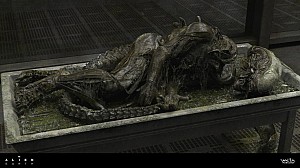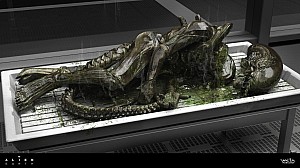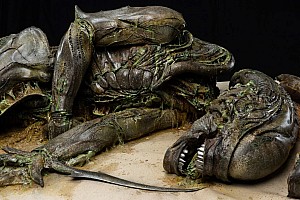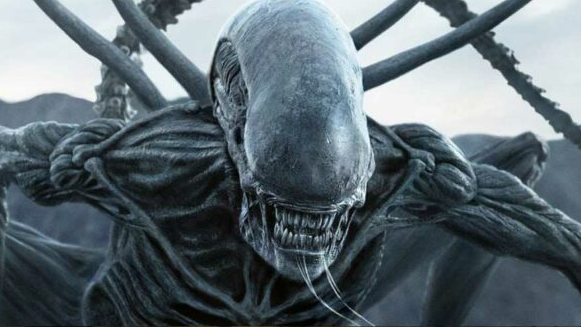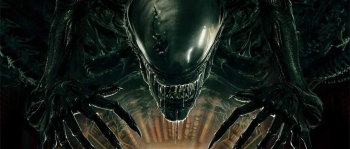POSSIBLE SPOILER - Dr Shaw meets Dr Jekyll but what’s in a name?
Prometheus Forum Topic
xenodochy
MemberOvomorphJun 18, 20121536 Views0 Replies**** WARNING **** This may or very well may not be a SPOILER. Hope it isn’t. This is also a bit long. Please bear with me. Hope it doesn’t bore anyone.
There’s a lot of people who left Prometheus thinking it a complete mystery of a movie, but let’s call it a "mystery play". Nowhere near as old as Christianity, Prometheus and the Sumerians, these were mediaeval religious dramas representing characters and events drawn from sacred history and the lives of the saints. So the first thing to do is name the parts.
Here are character names with their meanings in brackets. Other people have picked out some of them and I've probably missed some. This site is now quite a juggernaut so I hope that this does not replicate anyone else’s post.
• Janek (God is gracious)
• Meredith (Great Lord) Vickers (vicars? Substitutes in office)
• Peter (stone) Weyland
• David (beloved)
• Charlie (free man)
• Elizabeth (my god is a vow)
Two to guess at:
• Millburn (literally burning mill?)
• Fifield (fie – expressing disgust; and field – a field = a poisoned field?)
Doesn’t Janek graciously sacrifice himself, arms outstretched, alongside two crew? They are crewmen - aren’t criminal gangs referred to as ‘crews’? Perhaps the Crucifixion is recalled here.
Peter Weyland is a ‘stone’: he is not going to change and death is the ultimate change.
David is his ‘beloved’ but android while his flesh and blood daughter is his substitute or the ‘vicar of a great lord’ who accepts Janek.
Once both Weyland and Janek are dead, she has no purpose because there are no great lords left for whom she can substitute. So she dies.
Charlie is a ‘free man’ who, from David’s viewpoint, freely chooses to drink from the poisoned chalice and Elizabeth … does whatever she wants.
Millburn and Fifield are two very sloppy scientists and perhaps equate to the gravediggers or clowns in Shakespeare (they started life as the Vices of Mystery Plays) who knew better but remained just gravediggers.
Remember Sir Arthur Conan Doyle’s words in the mouth of Sherlock Holmes: “When you have eliminated the impossible, whatever remains, however improbable, must be the truth”? Think about Elizabeth’s physical feats and the circumstances in which they happen and ask: can any human woman do that? The answer is no, it’s impossible. So, improbable though it may be, she must no longer be entirely human but a woman overtaken by alien DNA. Like Dr Jekyll, she is changing.
Her mindset has also changed. Her self-administered operation in a male MedPod is a caesarean. So she’s comfortable with giving birth to what anyone else would call a monster. That is of no consequence to her as long as it is not inside her. Then she walks “naked” into a meeting room. Again, this does not bother her. Why not? Because she has lost her sense of shame.
How so? Adam (the first man) and Eve (his third of three mates) ate of the fruit of the tree of knowledge of good and of evil set in the very middle of the Garden of Eden. Suddenly they were ashamed of their nakedness, sewing aprons made from fig leaves to cover themselves and hide their shame.
Maybe Prometheus’ Elizabeth is a new Eve, so has changed from a victim of the initial script draft to the focus of the movie and any sequel. She gave birth to the potential Destroyer of mankind on Christmas Day, the anniversary of the Biblical Elizabeth’s cousin, Virgin Mary’s giving birth to the Saviour of mankind.
Then there’s the Engineer, awoken from long stasis, killing only when Elizabeth has been struck. Why? Did he first think that his rousers were the gods of antiquity that had created him and through his obedient kind, mankind? Then, when they asked for his assistance, it dawned that they were the very creatures he had been charged with destroying! And they were creating their own new “life”-forms. Just as he knew that David had no DNA, he recognised that Dr Shaw had xeno DNA. He kills everyone but her. Then, when his craft crashes, his lethal cargo destroyed, he seeks her out to subdue, capture and transport to Earth. And did she in fact lure the Engineer to where her new born could eliminate him? If so, Elizabeth is saying not, as Janek did, "I'll sacrifice myself for the sake of others," but "you die so that I may survive." From an Engineering standpoint, she would be the perfection of the xeno experiment they had been trying for so long to accomplish.
This links up with Prometheus (fore-thought). He stole fire from the gods to give to men and they ceased to know their fate, destruction by Zeus, as now they had reason, the means to discover and understand life for themselves: to become equal with the gods. What does the eagle peck out from Prometheus, chained to the rock? His liver, once known as the seat of emotions, those resolve-sapping and life-changing feelings which have separated us from the ‘super’ beings in so much Sci-Fi.
There was another outcome: the gods created and sent Pandora (all-giving) to marry his brother, the foolish Epimetheus (after-thought). Her wedding gift was an urn (vessel - womb?) containing evils with which to give men death! Fortunately hope remained though.
Epimetheus was credited with bringing mankind an appreciation of human interdependence – which we’d need if any sequel is a blood ‘n’ guts shoot-em-up!
Just a few thoughts. It’s all just one way of looking at the movie but are there Plot-Holes? No.
Are you an avid Alien fan looking for a dedicated online community of likeminded fans? Look no further! Create your own profile today and take part in our forums and gain XP points for all the content you post!


